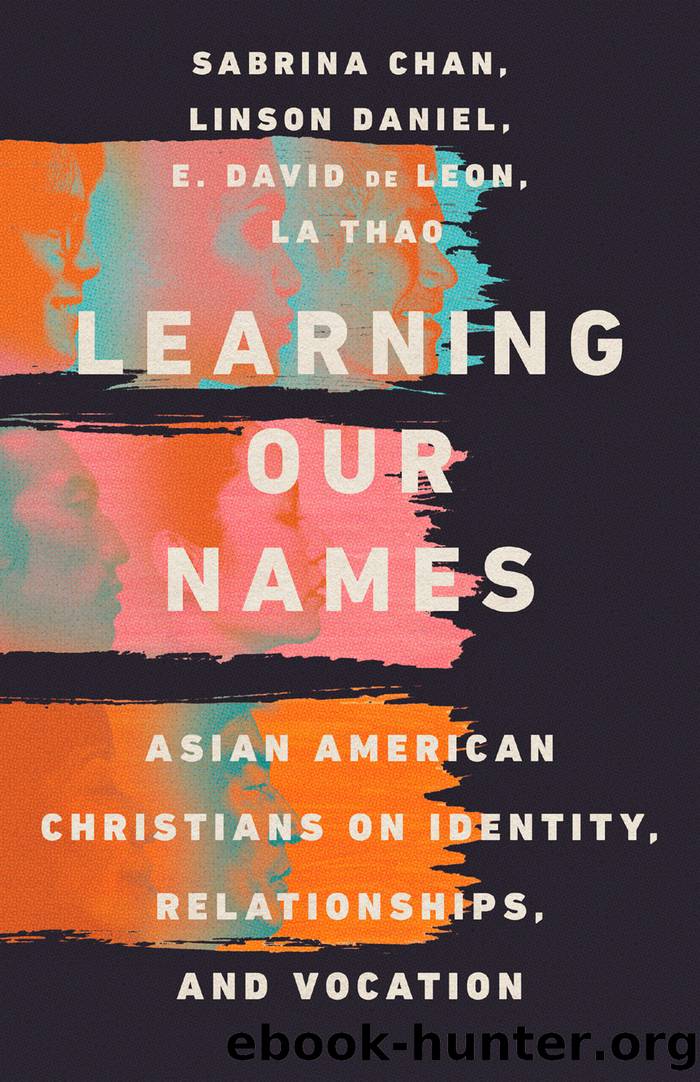Learning Our Names by Sabrina S. Chan & E. David de Leon & La Thao & Linson Daniel & Sabrina Chan

Author:Sabrina S. Chan & E. David de Leon & La Thao & Linson Daniel & Sabrina Chan
Language: eng
Format: epub
Tags: Asian American Christian;multiethnicity;immigrant;AAPI;Pacific Islander;ethnic identity;ethnicity;racialization;model minority;diaspora;Korean;Chinese;Pilipino;filipino;philippino;Indian;Hmong;hong kong;East Asian;Southeast Asian;South Asian
Publisher: InterVarsity Press
Published: 2022-06-08T11:34:49+00:00
What Matters More?
In a book that begins with a married couple in Genesis 1 and ends with a wedding in Revelation 21, does the Bible have anything to offer to single people? It may seem like the Bible is saturated with marriage, couples, and their children, but there are numerous stories of people that do not involve marriage. Miriam, Jeremiah, Mary Magdalene, Martha and Mary of Bethany, and John the Baptist are a few examples of faithful people known for more than being a wife or husband.
Two of the most well-known single people in the Bible are Jesus and Paul. Not only was Jesus never married, but he also taught about marriage and singleness. According to Jesus, married and single individuals are all part of the kingdom (Matthew 19:1-12) and our earthly marriages are not eternal (Matthew 22:23-30).
Paulâs encouraging words in 1 Corinthians 7 are often used to teach about singleness. Paul writes to a Christian community that disagreed on their views on sex and marriage. Some were too lenient about the sexual sin happening within their community while others promoted celibacy, even within marriages. Paul addresses their concerns, and like Jesus he was not afraid to undermine the expectations for people to marry. In the case of the widows, he encourages them in singleness, stating that it is good, but he does not bar them from choosing to remarry (1 Corinthians 7:8-9). There was strong pressure for widows to marry, but those who promoted a purity culture in Corinth put the widows in a tough spot. Paul gives a similar response to those who were considering getting married. Singleness is fine, but it is also good to marry (1 Corinthians 7:36-38).
Paulâs concern is not to give the Corinthians a yes or no answer to their questions about marriage and celibacy. First, Paul releases them from the pressure to marry by affirming their singleness. Next, he affirms those who are choosing to marry. Paul recognizes that sexual desire is powerful and should be considered in oneâs decision to marry. In this response, he is offering them freedom from the perceived shame of choosing to marry. So why does Paul respond in this way? Most importantly, why does he promote singleness?
For Paul, nothing matters more than our devotion to God. Free from the concerns of marriage, unmarried adults can give their undivided attention to faithfully serving and following Jesus. Married couples must selflessly love and serve each other as they are committed to doing in marriage. This is all part of Godâs will for marriage, but their devotion to God will be divided by their responsibility to each other and their children. That does not imply that single people should serve God more than married people. It is not about how much more we can do, but how much more boundless our love can be toward God and people. It is a wonderful gift to know God more fully and more intimately due to having undivided attention to God. Married or single, we are all called to devote ourselves to God.
Download
This site does not store any files on its server. We only index and link to content provided by other sites. Please contact the content providers to delete copyright contents if any and email us, we'll remove relevant links or contents immediately.
Machine Learning at Scale with H2O by Gregory Keys | David Whiting(4292)
Never by Ken Follett(3937)
Fairy Tale by Stephen King(3369)
Reminders of Him: A Novel by Colleen Hoover(3088)
The Man Who Died Twice by Richard Osman(3070)
Will by Will Smith(2906)
Rationality by Steven Pinker(2351)
It Starts With Us (It Ends with Us #2) by Colleen Hoover(2338)
Can't Hurt Me: Master Your Mind and Defy the Odds - Clean Edition by David Goggins(2320)
Friends, Lovers, and the Big Terrible Thing by Matthew Perry(2219)
The Becoming by Nora Roberts(2188)
The Stranger in the Lifeboat by Mitch Albom(2113)
Love on the Brain by Ali Hazelwood(2059)
New Morning Mercies: A Daily Gospel Devotional by Paul David Tripp(1913)
A Short History of War by Jeremy Black(1842)
The Strength In Our Scars by Bianca Sparacino(1840)
HBR's 10 Must Reads 2022 by Harvard Business Review(1838)
A Game of Thrones (The Illustrated Edition) by George R. R. Martin(1711)
Never Finished: Unshackle Your Mind and Win the War Within by David Goggins(1703)
